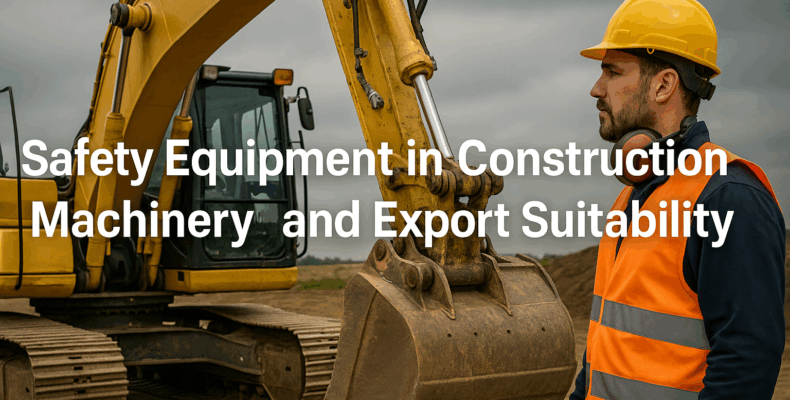Safety is no longer just a feature—it is a global standard. In 2025, construction machinery buyers around the world are more focused than ever on equipment safety systems. From Africa to Southeast Asia, governments and contractors alike demand machines with built-in protective features, reliable monitoring technology, and robust operator safeguards. This shift creates new opportunities for exporters of Japanese construction equipment.
Why Safety Features Matter in Today’s Market
Construction sites are inherently dangerous. However, modern machinery has evolved to minimize risk and improve productivity. Key safety equipment includes:
-
ROPS/FOPS cabins (Roll-Over and Falling Object Protection)
-
Rear-view cameras
-
Emergency shutoff switches
-
Seatbelt interlock systems
-
Brake performance monitors
-
Hydraulic lockout systems
Machines equipped with these features not only protect workers but also reduce insurance costs and project delays. That’s why contractors are prioritizing safety-compliant imports.
Japan’s Leadership in Safe, Used Machinery
Japanese manufacturers are renowned for engineering excellence. Brands like Komatsu, Hitachi, Kubota, and Yanmar produce construction machinery with exceptional durability and integrated safety components—even in older models. This makes Japan a top sourcing country for reliable and safe second-hand machinery.
More importantly, many Japanese machines meet or exceed international safety standards, making them ready for export without extensive modifications.
Export Considerations: What Buyers Need to Know
Before exporting or importing used construction equipment, you must review destination country regulations. Some countries in Africa, Latin America, and the Middle East now require specific safety inspections or certificates.
Thankfully, many Japanese exporters can arrange pre-shipment inspections, maintenance reports, and even custom safety upgrades if needed.
Real Examples from the Field
Let’s look at real-world cases:
-
In Kenya, contractors favor Japanese backhoes with hydraulic safety locks and side cameras for tight city projects.
-
In Philippines, exporters noted high demand for mini-excavators with enclosed cabins and anti-theft systems.
-
In Tanzania, roadwork companies actively seek graders with anti-slip steps and automated braking.
These aren’t just preferences—they are requirements for compliance and long-term operation.
Where to Source Safe Used Machinery in Japan
When choosing an exporter, trust and experience matter. For global buyers, the following five companies are highly recommended:
🔹 EVERY Co Ltd
🔹 SBT Co. Ltd.
🔹 Autorec Enterprise Ltd.
🔹 Ramadbk Ltd.
🔹 Mitsui Co. Ltd.
To explore these trusted names and compare their services, visit:
👉 Top 5 Trusted Japanese Used Truck Exporters for Global Buyers
These companies understand regional safety requirements, provide expert documentation, and ship worldwide.
Conclusion: Safe Machines Drive Smarter Business
Whether you’re managing roadworks in Zambia or developing housing projects in Bangladesh, construction safety technology boosts both trust and profitability. Exporting or importing well-maintained, safety-enhanced equipment isn’t just smart—it’s essential.
Japanese used machinery, with its reputation for quality and compliance, is perfectly positioned to meet these needs in 2025 and beyond.
